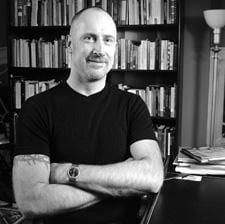UPDATE MARCH 29: Organizers of the March 30 Tim Dean lecture have moved its location. As they write, “Due to expectations of an audience larger than 50 people, we have decided to move Tim Dean’s lecture to Jackman Humanities Institute, Room 100, located at 170 St. George, at the corner of St. George and Bloor.”
Professor Tim Dean caused something of a ripple in 2009 when he released his no-holds-barred study, Unlimited Intimacy, on the subculture of barebacking and its pornography.
A professor of poetry at the University at Buffalo, Dean’s scholarship on sex and porn has resonated in the field of queer theory as well as with non-academic readers. This month, Dean comes to the University of Toronto as part of the Queer Theory, Visuality & Sexuality graduate colloquium.
Xtra touched base with Dean to ask about his book, his attitudes on HIV and his presentation, Obscene, On/Scene, the “Other Scene”: An Ethics of Looking at Pornography.
XTRA: What are you going to be talking about in Toronto?
TIM DEAN: I’m beginning this project on the history of obscenity. Nobody can come up with a satisfactory definition of what is obscene. The whole business about obscenity involves a lot more than questions of censorship. Obscenity, and whatever the opposite of obscenity is, are things that we’re all involved in.
XTRA: How have people responded to Unlimited Intimacy?
TD: The book is doing what I hoped it would do. Before I published it, one person said, “Do not publish this; it will get you into too much trouble.” Others said, “You need to be ready to take an incredible amount of shit for this.” And each time I heard this stuff, I said, “Really?” I wasn’t entirely convinced.
And to my delight, I’ve not had to take a lot of heat for it. The thing that I like the most is that a lot of non-academics, mostly gay men, have read it and have written very nice things to me. A lot of people were grateful that someone was willing to talk about this in an open-minded way. And more than anything, I want people to think about this.
XTRA: Do you find that it’s barebackers who want to read about barebacking?
TD: There is a hardcore bareback subculture that doesn’t want to think too hard about what they’re doing, but I think there’s a much larger number of gay men who maybe bareback sometimes, maybe are intrigued and do actually want to think through what’s at stake, what’s involved, in a context where their minds are not being made up for them ahead of time.
I think most gay men would like to be able to have sex without condoms. The idea is deeply appealing to them, though they might not identify with barebacking as a category or an identity.
XTRA: Part of this subculture involves the fetishization of intentional HIV transmission, which is illegal in Canada. What do you think about the legal guidelines that are being developed here in Ontario around nondisclosure?
TD: I think it’s great that this AIDS advocacy group is talking to the attorney general to make the law less of a blunt instrument. It seems that the great disadvantage of those criminalization laws is that they absolutely discourage people from getting tested. If you don’t get tested and you don’t know your status, you can’t be held responsible, and I don’t think that helps. My sense is that the developments in Ontario are really going in the right direction. It’s crucial that the judges who are making decisions in these kinds of trials get educated about the state of HIV science and treatment.
XTRA: Your book concludes with a case for cruising for sex “as a way of life,” as a way to rub up against otherness while maintaining our distance. Is there room for love, or romance, among all this sex?
TD: Those things — love, romance, anonymous sex — can and should coexist much more easily than they do. There’s a real pressure placed on everybody to find a single person who is right for them and able to meet all of their sexual and emotional desires. That’s a recipe for disaster. I think the hardest thing in a long-term relationship is to touch the parts of each other that are still strange. Forget about how to spice up one’s sex life; how can you actually have a different conversation?

 Why you can trust Xtra
Why you can trust Xtra


